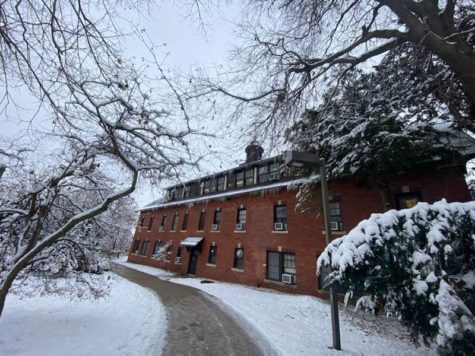Living options for many different tastes
June 21, 2010
For students moving away from home for the first time, choosing where to live may be a bigger stress than classes.
“It’s a totally new experience,” said Pete Englin, director of the department of residence.
On-campus, greek and off-campus living options each have their own unique benefits.
On campus: “Freshmen who lived on campus graduated at significantly higher rates than those that lived off their first year,” Englin said.
Students in each year who lived on campus had higher GPAs than their off-campus counterparts.
But only freshman-year living has been found to have a correlation with graduation rates – showing the importance of first-year housing.
“The ultimate goal is to get every student who attends orientation graduated,” Englin said. “University housing can help with that.”
For example, learning communities, many of which are residential, group students who have something in common, whether it’s the same major or honors standing.
Every student living in residence halls has a built-in group of peer leaders in their community advisers and house cabinets. In addition to governance, these groups organize activities for their houses.
“You can be very, very connected to campus – it’s the full college experience,” said Brittney Rutherford, marketing coordinator for the Department of Residence.
If nothing else, on-campus living has all the convenience the name implies – classes and activities are minutes away.
Since many of the residence halls require purchase of a meal plan, dining is also easily accessible.
On-campus living provides the convenience of paying by the semester, with no monthly bills, and no separate charges for utilities, TV, Internet or maintenance.
All campus buildings lock at night. Students in on-campus housing report feeling very safe.
“But people make the place far more than the facilities,” Englin said.
“It’s far more than a place to stay and food to eat, it’s about community and relationships.”
For these reasons and more, roughly 90 percent of direct from high school students choose on-campus housing.
Greek: Iowa State’s greek communities provide many of the benefits of university-affiliated housing, such as proximity to campus, but place added emphasis on building community.
“Students who go greek instantly have a network of leaders, scholars and philanthropists who share their values,” said Jennifer Plagman-Galvin, director of Greek Affairs.
Since not all greeks move into the house right away, it is possible for students to be in a greek chapter, a learning community, and a residence hall. Plagman-Galvin said students who do all three in their freshman year average the highest GPAs and retention rates of any group on campus.
Between 30 and 90 students live in each greek house. Living options vary, with bedrooms ranging from one to four people or cold-air sleeping.
Plagman-Galvin said the costs of living in greek housing are similar to a double room on campus with a meal plan – many greek houses provide meals to their students.
Finally, all houses have some form of security, and all are being fitted with fire sprinklers.
“We do feel like we provide comparable, if not better, living environments,” said Josh Knust, vice president of recruitment for the Interfraternity Council fraternities.
Off-Campus: Off-campus housing offers myriad options to students. Students choose to live off campus for space, privacy or financial reasons.
“You can live a college life while having your own space and privacy,” said Anthony Howard, leasing manager for Campustown Property Management.
Most off-campus housing options will come with private bathrooms and a full kitchen. Bedrooms may be private or shared, and residents usually choose between one and five bedrooms per apartment.
And there are many locations on Lincoln Way, just across the street virtually the same distance from campus as many dorms.
Howard said most who live with Campustown Property Management are students, so he felt there was still a sense of community. While freshmen aren’t the norm there, Howard said it’s not uncommon for a first-year student to move into an off-campus apartment with an older sibling.
Instead of hall directors or house parents, off-campus locations have landlords to supervise the buildings and take care of maintenance issues.
Off-campus living varies between companies, or even within the same company.
For example, some of Campustown Property Management’s properties include utilities in the monthly bill, and some don’t. Security features may also vary.
Often, leases will be for 12 months at a time, without accommodations for students who leave for summer or secure internships.
Still, the freedom and options available with off-campus housing appeal to many students.
















